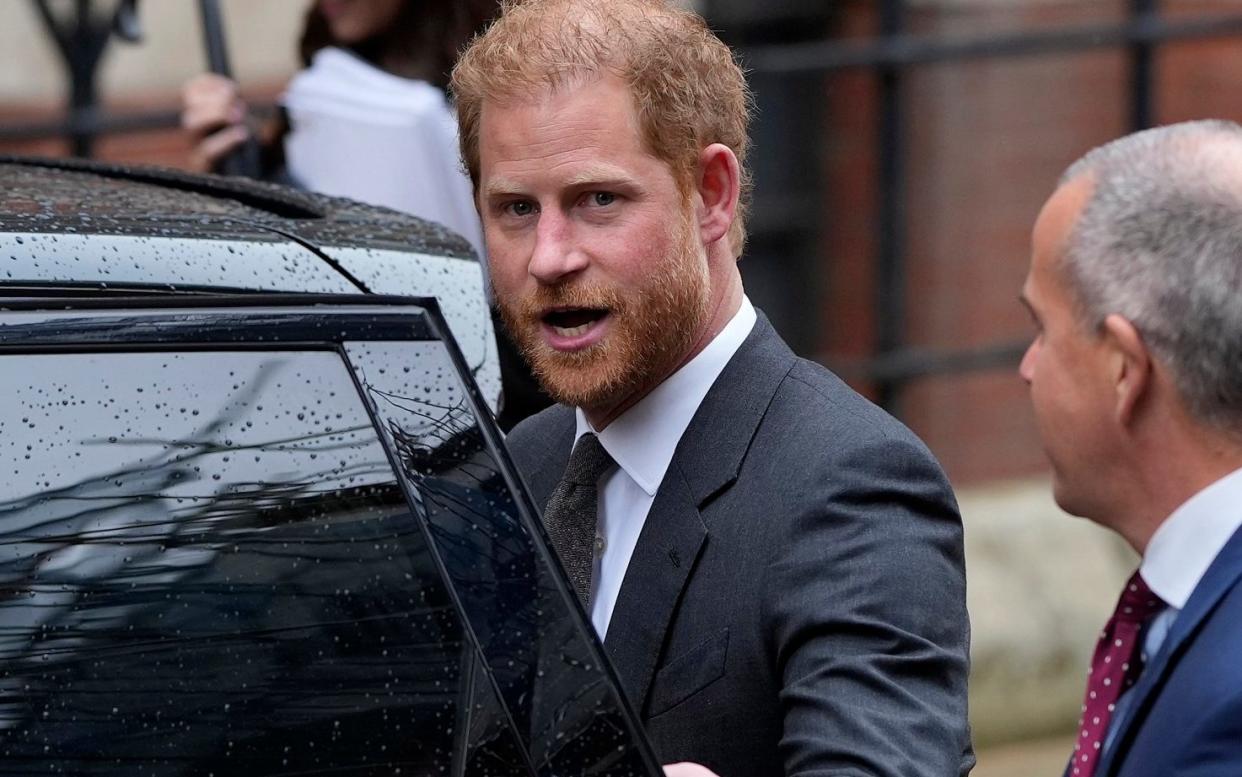Prince Harry: I was treated less favourably over police protection

The Duke of Sussex has claimed he was singled out and treated “less favourably” than others when he was denied the right to automatic police protection in the UK.
Prince Harry said the Home Office committee that withdrew his tax-payer funded security had subjected him to “unlawful and unfair treatment”.
His lawyer, Shaheed Fatima KC, told the High Court on Tuesday that it had also failed to consider the potential “impact on the UK’s reputation” of a successful attack on the Duke, “bearing in mind his status, background and profile within the Royal family”.
The Royal Household was said to have raised the death of Diana, Princess of Wales in its own correspondence on the subject and the committee was aware of the wider “impact” of any attack on her younger son as a result.
The Duke applied for a judicial review after the Executive Committee for the Protection of Royalty and Public Figures (Ravec) declared in February 2020 that he and his family were no longer entitled to the “same degree” of personal security when visiting Britain.
Instead, it created a “bespoke” approach that involves assessing each visit on its merits but has resulted in the Duke being denied police protection on each of his most recent six visits.
The Duke was given the green light to bring a legal challenge in July 2022 and his claim is being heard over two-and-a-half days this week, largely in private.
Court documents, while heavily redacted, show that the Duke is comparing his own treatment to that of specific individuals whose names have been withheld.
He said the “inconsistent approach” was demonstrated by the fact that a risk analysis was not carried out for him, as it was for others.
The documents allege that Harry had been “treated unfairly, as is clear when comparing his treatment to that of ----”.
They go on to state that “---- have never ---- but they have protective security”. Ms Fatima claimed that Ravec had chosen not to follow “its own written policy”.
Instead, she argued that a “far inferior” position had been imposed, lacking critical safeguards, and that the Duke had been given no explanation for such treatment.
“No good reason has been provided for singling the claimant out in this way,” she told Mr Justice Lane.
The Duke said that each time he had visited the UK since June 2021, he formally requested protective security in advance, giving the required 28-day notice.
‘Wholly inadequate’
However, the response on every occasion, which is largely redacted in court documents, is deemed “wholly inadequate”.
The decision to deny him protection during his flying visit for his father’s Coronation in May is branded “irrational” although the specific detail is redacted.
In response, Sir James Eadie KC, for the Home Office, insisted otherwise.
“Despite the fact that these matters have been explained to the claimant in correspondence and now in evidence, the claimant still fails to engage with the explanation given,” he said. “Ravec’s approach is unchallengeable.”
Sir James also chastised the Duke for comparing himself to other royals and VIPs who receive protective security, branding the argument “inappropriate”.
“There is no analogy to be drawn with others,” he said. “That is not the basis upon which Ravec makes individualised assessments.”
In written submissions, Harry’s lawyers express incredulity that “a prince of the realm” is not protected by state security when in the UK, noting that the risk arises from his birth and by virtue of the fact that he is the King’s son.
However, elsewhere they insist that he believes he is entitled to state security because of the threats and risks he faces and not “simply by dint of who he is”.
In an email the Duke sent to Sir Mark Sedwill, then cabinet secretary and UK home security adviser, in February 2020, he wrote: “The argument being based on amount of time or work spent in the UK and in our case, for the Royal family, isn’t relevant when the threat to our everyday life is as high as it is.”
Sir James argued that the Duke had been treated in a lawful, “bespoke manner”, befitting his circumstances. This nuanced approach was considered “appropriate and reasonable”.

In written submissions, the barrister noted that there were “finite public resources” for state-provided protective security and that it was “plainly rational” for Ravec to consider that the Duke was stepping back as a working member of the Royal family.
The Duke’s suggestion that there was “no evidence” the impact of a potential attack had been considered was dismissed as “simply incorrect”.
Sir James said: “Ravec was aware of the wider ‘impact’ following the tragic death of the [Duke’s mother], and this was also a matter referenced by the Royal Household.”
He said the committee had given greater weight to the impact on state functions being lessened over “likely significant public upset” were the Duke to be attacked.
The barrister said the Duke simply disagreed with the expert judgment of Ravec.
“He wishes his ‘background, role and status’ to be treated as only rationally capable of one outcome,” he said. “Ravec was not under any legal duty to share that view, and it is not the only one rationally available.”
The committee was “well aware” of the Duke’s status, background and profile and had adopted a flexible approach “precisely” to recognise that such factors might warrant exceptions being made in the future, he added.
A risk assessment was deemed of limited use as it could not accurately assess impact or judge the Duke’s vulnerability to an attack when it was not known how long he would be in Britain or what he would be doing here.
The hearing continues.

 Yahoo News
Yahoo News 
